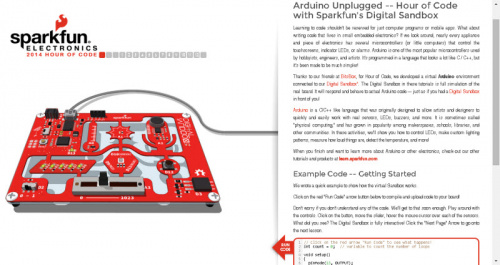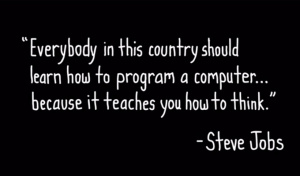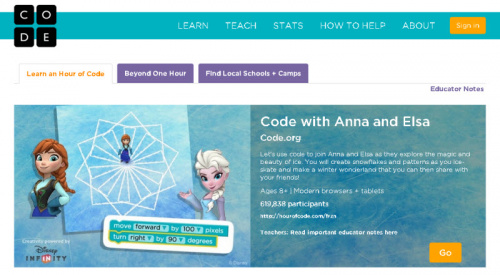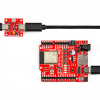Whether you use Arduino, Raspberry Pi, or the Intel Edison, we can probably all agree that programming and writing code are a central part of what a lot of makers/hackers do -- especially here at SparkFun. Do you remember when you first learned to write your first program? Do you remember how it felt? I do.
I was about 8 or 9 years old. At this age, I had very little control over my own life. My parents told me when to wake up, go to school, eat and go to bed. My choices were pretty limited. But when I learned to write my first lines of code, I felt a sense of empowerment in that I could tell this thing, this machine, what to do -- and it did it! I found a sense of control over the world around me that I desperately yearned for.
]10 PRINT “BRIAN IS AWESOME!!!”
]20 GOTO 10
An example of my first program ever. Written in Apple BASIC
Learning to program is a basic literacy skill that should have the same focus as reading, writing and arithmetic do in our schools. According to code.org, roughly 90% of schools don't offer any type of computer science or programming options for students. This week -- Computer Science Education Week -- is dedicated to encouraging as many students to participate in an Hour of Code. The Hour of Code is a mission created by the team at code.org to provide opportunities and experiences for ALL students to learn to code.
Last year, the Hour of Code reached over 15 Million students in one week! During that week, “[m]ore girls tried computer science than in the last 70 years." This is such an incredible program and initiative. From CEOs of major companies to Will.i.am to President Obama, this week, the Hour of Code movement is connecting with children across the world!
By the end of 2014, code.org hopes to reach over 100 Million students!
Hour of Code
Take a moment with your own children or children in your local community, schools and libraries to participate in an Hour of Code. Experiencing just one Hour of Code can influence our future generation with an immediate sense of success, pride, and confidence.
The team at code.org have curated an amazing list of resources and activities for individuals, teachers, or entire schools to conduct with their students. Check out the activities at code.org/learn. These activities are appropriate for all students from ages 4 - 104.
Some of our favorites include:
BitsBox -- the latest javascript app development environment for designed for kids.
Beyond an Hour of Code -- SparkFun & Arduino
In partnership with our friends at BitsBox, we have created an on-line virtual Digital SandBox /Arduino programming environment for Beyond an Hour of Code.
Please Note: As of 4/5/2019 this virtual Digital Sandbox is no longer supported. We apologize & encourage you to explore the real SparkFun Digital Sandbox & reach out to us with any questions you may have.

This week - we urge you all to spend an hour with your children and learn to code. Whether you're a programmer or not -- check out the amazing activities at code.org. There are a number of local events worldwide -- ask your neighborhood school, library, or community center.
Share your Hour of Code experience -- #HourOfCode
“Every student in every school should have the opportunity to learn computer science”












I learned programming at the ripe age of about 12. Back then, the standard computer in my school was an Apple ][e and all anyone did with them is write in basic. It turns out that I probably didn't appreciate that skill as much as I should have until many years later.
My job in college was to repair VCR's and televisions for a media department in the library. I worked there anytime I wasn't in class during the day and most of the equipment back then was designed to be repaired. We even had service manuals for everything.
You might be thinking that job was easy, right? Well, no. Even though you have the manual, you still run into situations where you have to work out how a circuit works and then figure out what it is that's making it malfunction. It didn't really matter that you had the full schematic and the values of a few test points. The design of the circuit was not documented anywhere so you had to figure out a lot on your own.
I initially found this frustrating. I was several years into my degree in electrical design and still had some projects that I couldn't really figure out. I asked one of my co-workers to take a look at a problem I was having (he was a photography major) and he very methodically worked out the absolute logic that had to be followed to determine how it worked and where it had malfunctioned. In short, he used the one skill I hadn't thought to use and solved the problem in no time.
I do a lot of sysadmin support and I'm still finding that education in logic to be very useful. People come to me with issues and I do my best to figure out logically why something isn't working. The people I work for can be fairly irrational. "The mouse only works when I press on this corner of the computer's case" is one example. "It just doesn't want to work today" is another. In reality, the day of the week has nothing to do with why something isn't working. Usually the problem is something entirely unrelated like not allowing their favorite pet to chew on the cords in back of the computer.
I don't think an education in programming will solve that last bit, but I don't think it would hurt either.
I think that the childen should also be encouraged to learn robot programming, not just programming in general.
There are some sites that teach this subject so that even children can follow, for example: http://easyrobotsimulator.com/
I've done my part. Still trying to convince my sister to user her SIK that I bought her.
Last Christmas I gave an SIK both to my brother and my brother-in-law. Then I essentially lured them into competing with each other as to who could get through the whole thing first. Turns out my brother had an unfair advantage as he's worked as an electrician for 25 or so years, while my brother-in-law's gourmet chef experience really didn't help at all.
I posted links to both the Coding with Anna and Elsa and the Khan Academy Hour of Code. Trying hard to get my friends, but more than that, my friends kids, excited about coding. And truth be told, my Java sure could use some brushing up.
I know what I'm going to do... Try to finish an OpenCL coding project in an hour. Probably not possible, but worth a shot!